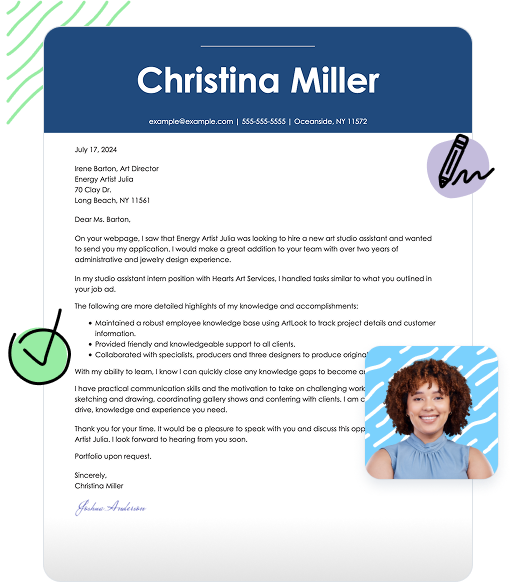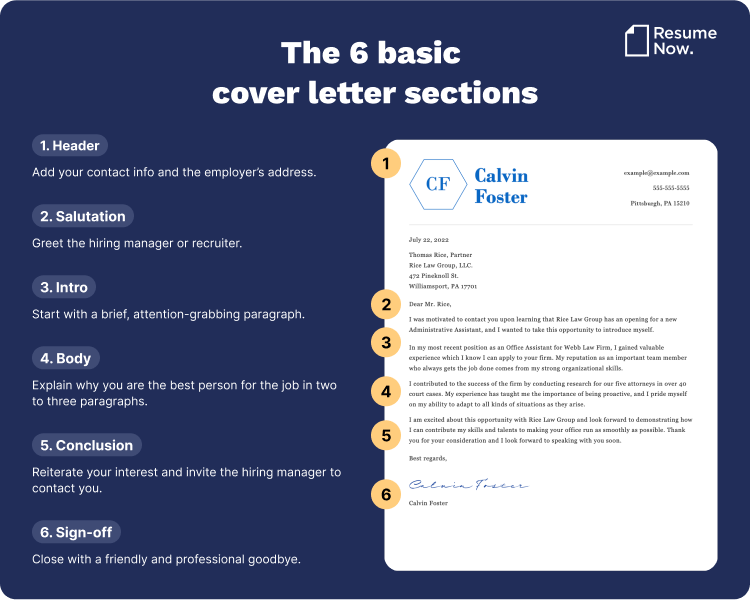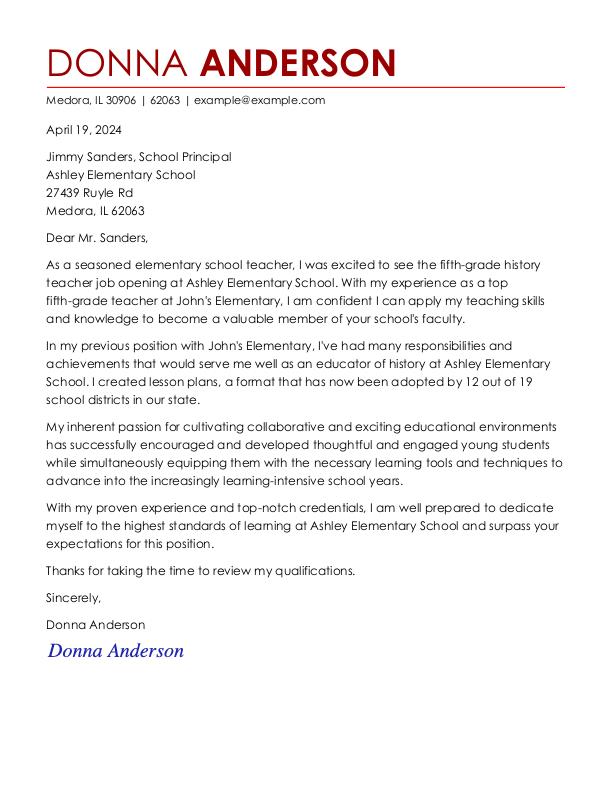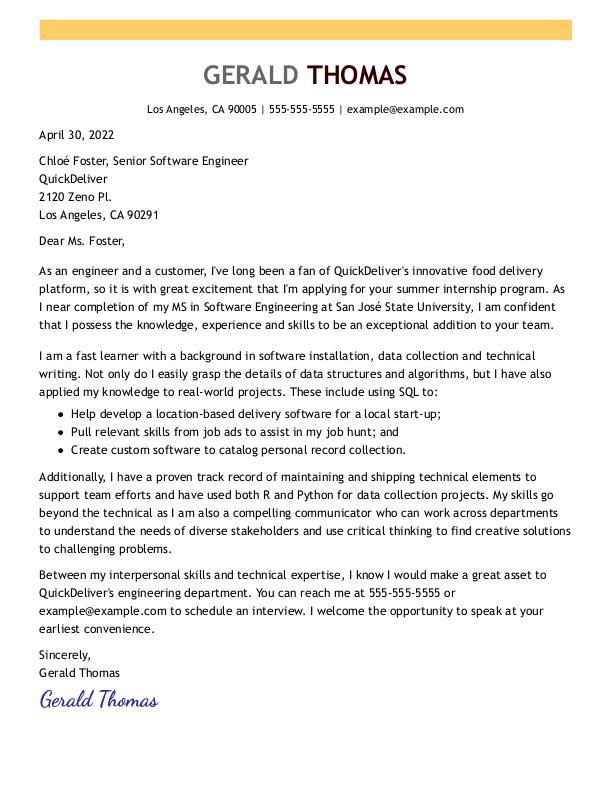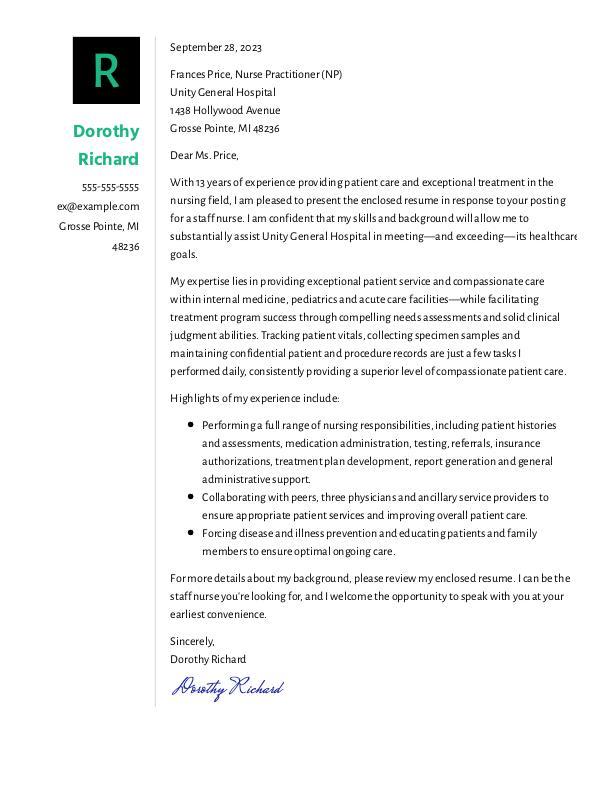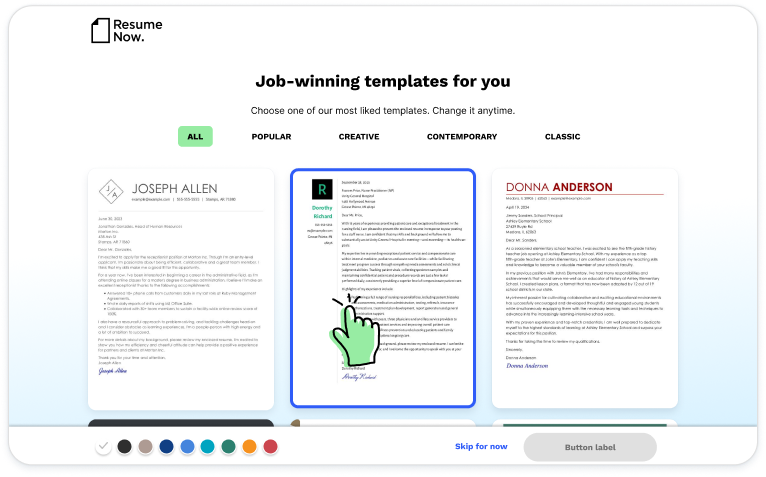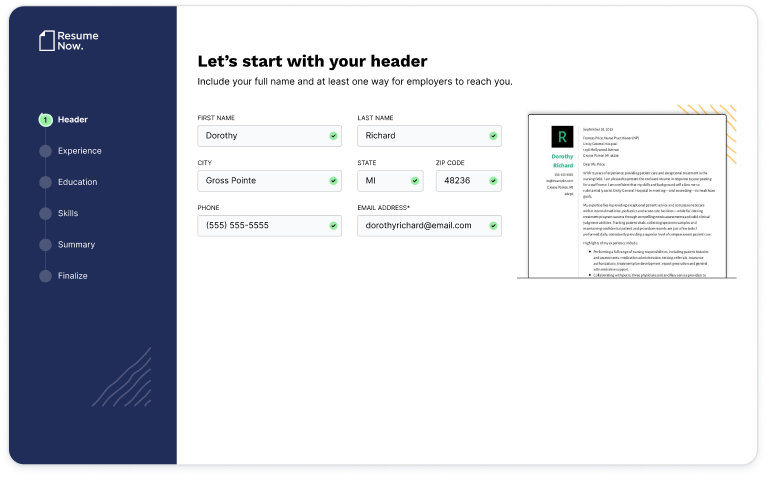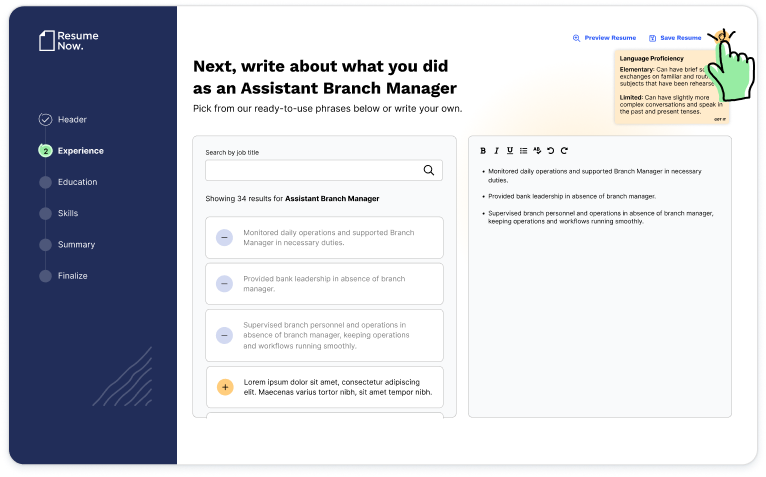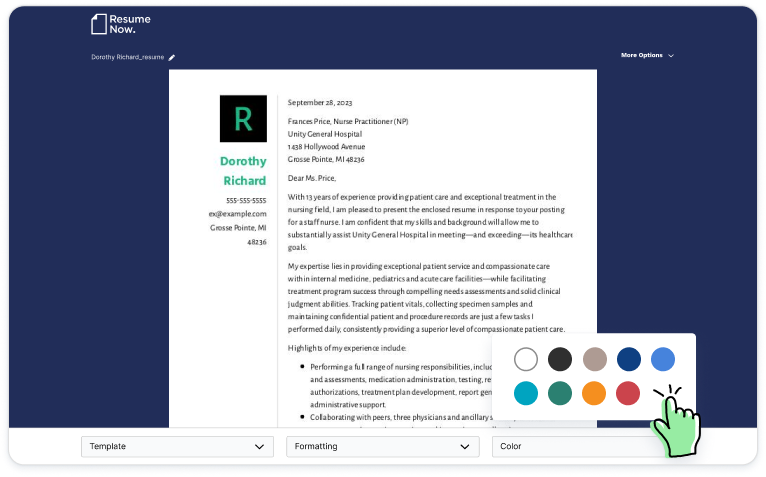Table of contents
A lot of the time, getting a job means making a strong first impression and bringing the qualifications from your resume to life. That's where learning how to write a cover letter comes in. It's an opportunity to communicate to employers how your skills, professional achievements, and work experience make you the best candidate for the position.
Don't worry if you're not sure where to get started.
This comprehensive guide will show you:
- What a cover letter is
- How to write a cover letter in seven simple steps
- Cover letter samples for inspiration
- Tips for making a cover letter stand out

Ready to get started on your job-winning cover letter? Skip this guide and head to our AI Cover Letter Generator. This tool provides writing tips and suggested text based on your job and career history—and it only takes a few minutes.
What Is a Cover Letter?
A cover letter is a one-page document that is submitted with a resume or a CV during the job application process. The purpose of a cover letter is to:
- Provide details about your most relevant skills, experience, or achievements
- Explain to potential employers why you want to work for them
- Explain circumstances like resume gaps or career changes when necessary
All of this helps you stand out, since recruiters and hiring managers must sift through countless applications. After writing a resume, your cover letter adds a personal touch that highlights specific qualifications and your genuine interest in the role.
So don't let yourself go unnoticed! A perfect resume may not be enough to show employers what makes you the best candidate for the position. Learn how to make a cover letter that crafts a narrative about your professional journey and elevates your application to the next level.
What a great cover letter looks like
Here's an example of the format and structure to help you get started writing a cover letter:
How to Write a Cover Letter in 7 Simple Steps
Learning how to create a cover letter is all about flow. Each step builds off the previous and brings your document into sharp focus. By the end, you should have a cover letter that addresses the question, "Why should we hire you?"
1. Pick a template
Cover letters look best on a professional template that:
- Is ATS-friendly to ensure that your resume passes through applicant tracking systems (ATS)
- Uses simple formatting techniques to make the document easy to read
- Complements your resume templates to help you create a cohesive application
Don't overthink this step. When in doubt, use the same template that matches your resume, ensuring that they are both ATS-friendly. If you aren't sure where to begin, you can browse our cover letter templates to find a design that works for you.
Your cover letter should be your resume's wingman, and the two should look like they belong together.
2. Add your contact information in the header
The cover letter header will be at the top of your page and oriented left, right, or center, depending on the format of your template. It should include your:
- Full name
- City and state
- Phone number
- Email address
- LinkedIn profile or professional website if you have one
Your header must also contain the date you submit your application and, when possible, the name, role, and address of the person you are writing to.
Here's how your header should look:
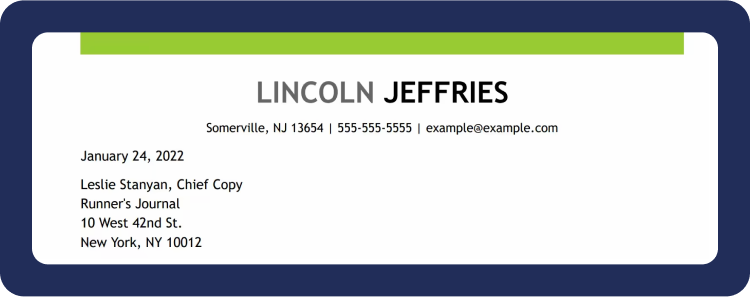
The contact information in your cover letter heading should be identical to the contact information you use for your resume. If you add a link to your portfolio or LinkedIn account on your resume, then add it to your cover letter, too.
3. Greet the hiring manager by name
Address the hiring manager or recruiter by name whenever possible. Sometimes a job posting will include the name and email address of the person to contact.
If you don't know whom to address it to, do some research. Comb through the company's website, dig deep online, call the company, or use LinkedIn to learn the hiring manager's name and greet them like so:
"Dear Sam Smith," "Dear Dr. Kenney," "Dear Professor Liu." Never use informal greetings like "Hi," "Hello," or "Good morning."
If you need to address a cover letter without a name, then write a greeting like "Dear Sales Hiring Manager" or "Dear Sales Team."
Avoid using clichéd greetings like "To Whom It May Concern" that are considered outdated and too impersonal.
4. Introduce yourself
Start your cover letter by showing your interest and enthusiasm for the role. Engage the reader with a concise explanation of who you are, why you are writing, and what makes you a qualified candidate for further consideration.
Here are examples of positive and enthusiastic cover letter opening lines:
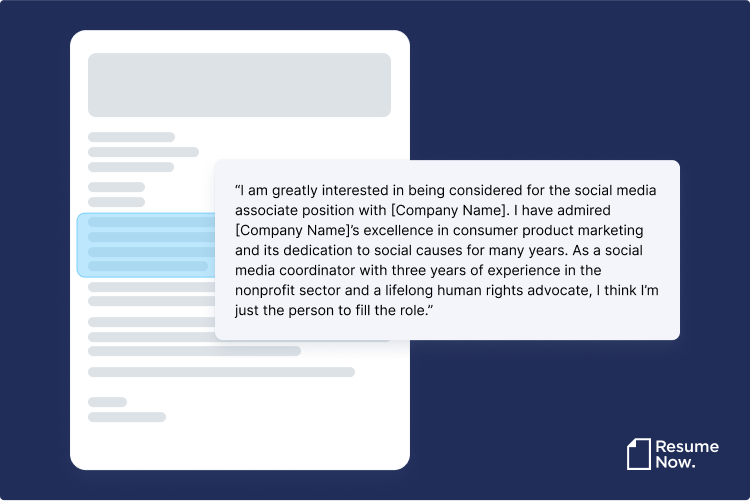
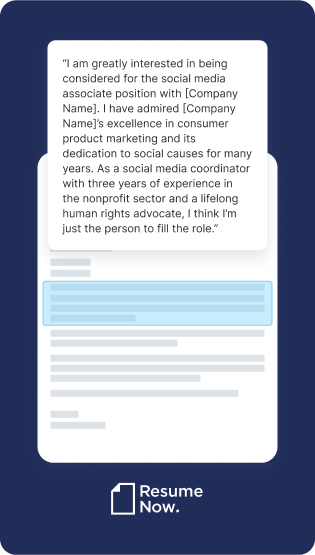
Opening paragraph for a social media role:
"I am greatly interested in being considered for the social media associate position with [Company Name]. I have admired [Company Name]'s excellence in consumer product marketing and its dedication to social causes for many years. As a social media coordinator with three years of experience in the nonprofit sector and a lifelong human rights advocate, I think I'm just the person to fill the role."
Opening paragraph for a technical writer role:
"I'm very interested in your job posting for a technical writer with [Company Name]. I am a methodical and detail-oriented professional with more than five years of experience as a technical writer for software companies in Silicon Valley. You will find that I have a track record of exceeding deadlines and improving workflows to ensure that projects run smoothly and efficiently. I'm sure my experience and varied skill set could benefit the position and [Company Name]."
When done correctly, your cover introduction will encourage the reader to learn more about you, so get right to the point and save your details for the body of your cover letter.
5. Write your body paragraphs
Your cover letter's body paragraphs should demonstrate how your skills and experience make you a qualified candidate through the use of metrics and specific outcomes. Describe your most relevant achievements, the reasons you're interested in the role, and your relevant skills in a few concise paragraphs.
Here are a few tips for writing an enticing body paragraph:
Demonstrate your personality. Cover letters are meant to give employers a glimpse of the person behind the letter. Show them what makes you unique.
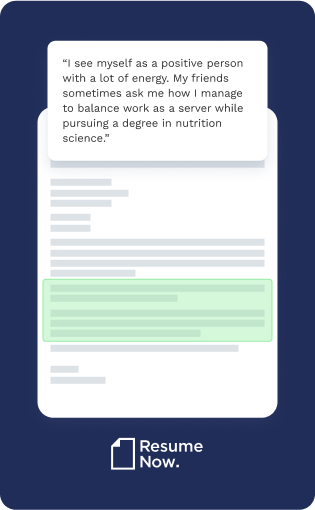
Describe specific aspects of your related experience. Part of this is calling out your most admirable and relevant achievements and briefly telling the stories behind them. Use specific outcomes and numbers to back them up wherever possible.
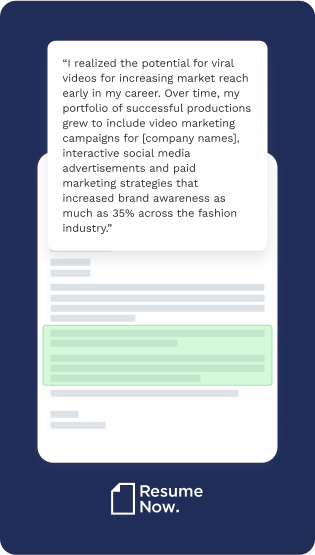
Highlight transferable skills. This is especially important for those candidates who are making a career change or who have little to no work experience. Use your cover letter to highlight the skills you possess that would be useful in the role you're applying for.
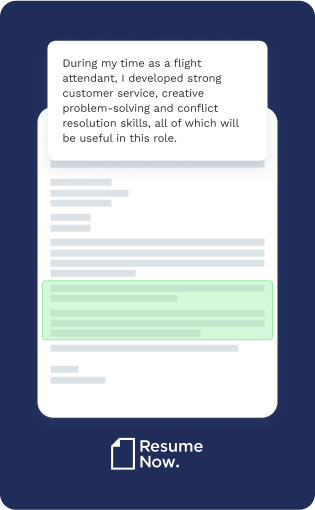
Explain gaps in your resume. These may include gaps from being laid off or fired, taking a break to raise children, or a string of short-term jobs. Addressing any unique circumstances gives you the chance to explain why those experiences add to your qualifications.
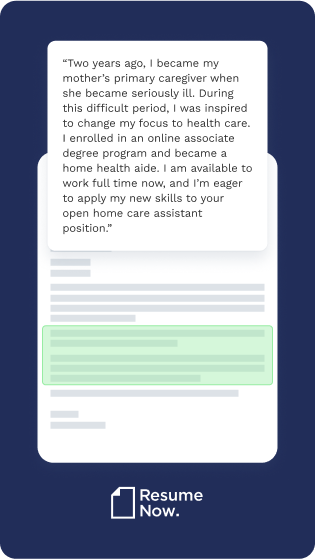
Consider using a bulleted list. Many hiring managers and recruiters may only skim as they read, so a bullet-point list on your cover letter can make your most relevant qualifications stand out better.
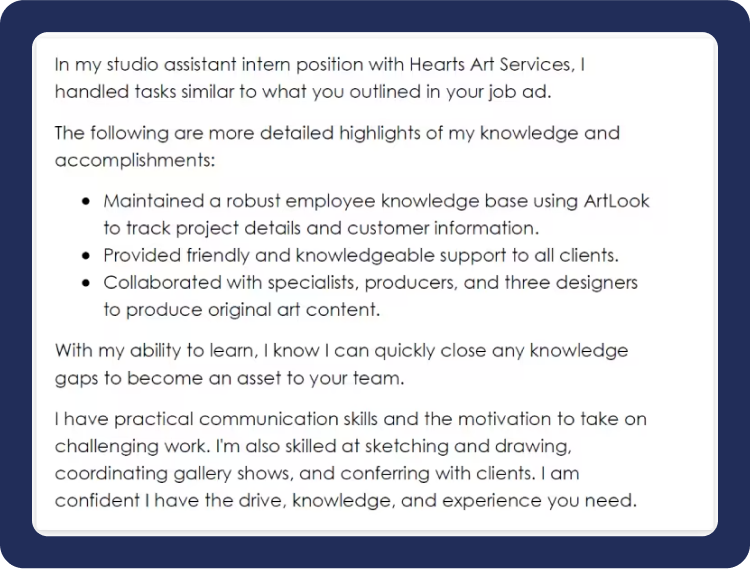
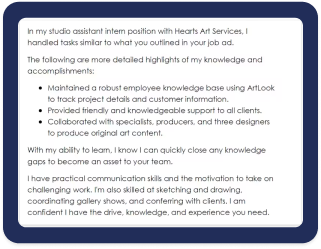
Always talk about the impact of your qualifications and how they apply to the employer's needs. This makes your cover letter more ATS-friendly and easier for the reader to understand, especially when you incorporate keywords.
6. Write your closing
A cover letter closing is where you reiterate your interest, thank the hiring manager for their time, and invite them to follow up with an interview. This section should be confident, assertive, and polite.
For example:
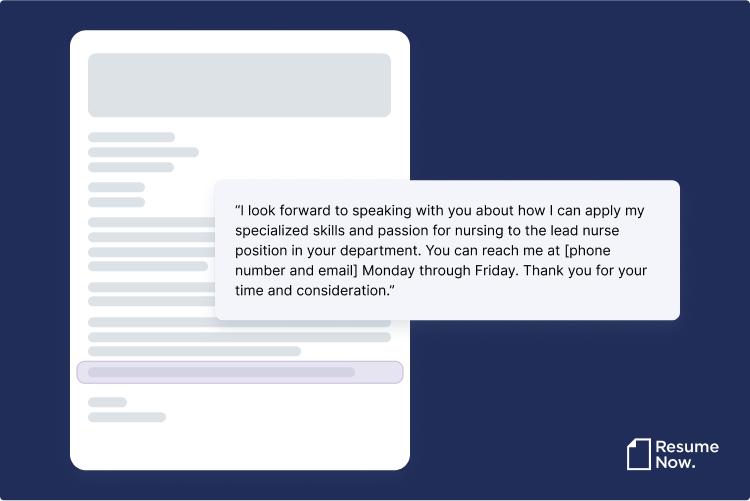
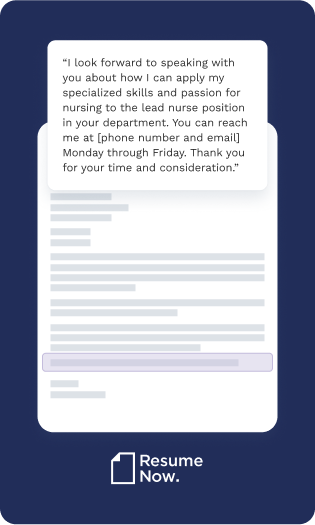
There's a fine line between inviting the hiring manager to connect and being pushy or desperate. Avoid statements like, "I really want this job, please contact me for an interview," and "I will call you tomorrow to discuss my qualifications."
7. Sign off
The signature is where you politely sign your cover letter. Popular sign-offs include "Sincerely," "Thank you," and "Respectfully."
After your closing paragraph, add a line break, write your sign-off, add another line break, and sign your full name.
Avoid informal sign-offs, such as "Cheers," "Love," "Take care," or "Warmly," even if you know the hiring manager very well.
Cover Letter Examples for Guidance
Check out the following cover letter examples, which demonstrate all the best practices listed above. They can provide inspiration and direction as you start to write your own.
Cover letter for a teaching job
Cover letter for an internship
Cover letter for a job with no experience
Cover letter for a nursing job
Cover Letter Tips to Help You Write
So you know how to create a cover letter, but is that enough? Review the following cover letter tips to optimize your letter even further.
Tip #1
Convey knowledge about the company
Research is crucial when writing a cover letter. You must learn about the prospective employer so you can speak to how you're a possible match. Applicants who make an effort to find out more about a company and show this in their cover letter are preferred because they show commitment.
While conducting your research on how to make a cover letter, ask the following questions:
- What product(s) or service(s) does the company provide?
- What is the company culture? Do you feel you're a good match for their culture?
- What are the company's values, challenges, mission, and goals? Do you feel you could support them in achieving their mission and goals?
- Who are their competitors? If you're familiar with their competitors, it may be helpful to share this fact in your cover letter.
Tip #2
Tailor your message to a specific job and employer
Once you've done your research, you're ready to customize your cover letter for your target company. One way to do this is to tailor your skills to the job requirements and match your achievements to the tasks of the role, much like a targeted resume.
Do this by studying the job description and adding a sentence or two that tells employers how you have used the required skills in the past. For example, if a job requires familiarity using WordPress, you can say: "I have six years of experience using WordPress and have the ability to read and write HTML."
Tip #3
Consider your audience
To make an impact, you've got to think about who will be reading your cover letter. Chances are, your letter will be read by:
- ATS. Many hiring managers and recruiters often use ATS software, which scans and sorts cover letters and resumes to weed out those that don't match a job's required skills and experience. To get past them, use keywords in your cover letter that best describe the company, the job description, and the position.
- Recruiters and hiring managers. Recruiters rate and rank candidates for interviews. They look for the "best of the best," scanning cover letters for achievements, awards, and unique skill sets. When writing your cover letter, be sure to emphasize your most relevant successes and how you can apply them to the job. Busy hiring managers want to see a well-thought-out cover letter that shows you understand the role, took the time to learn about the company, and have the qualifications necessary to perform the job.
Tip #4
Demonstrate your potential value
Ask yourself the following questions to make sure you have showcased your value:
- How would you help the company meet its goals? For instance, if a retail business or manufacturer wants to expand its sales operations, share examples of your related achievements in this area.
- How would you help to further their mission? If you want to work for a company because you know its purpose is to sell only sustainable products, mention your passion for environmental causes. If you volunteered for a green organization, weave that experience into your narrative.
- How would you help support the company's ethics, business, or values? For example, if you've learned that the company wants to expand its charitable outreach to nonprofit organizations and you've worked for nonprofits, definitely highlight this experience.
- How can you help them solve a problem? Demonstrate how you can provide a solution to a problem you may have discovered through your research.
Tip #5
Include as many specific details as possible
Employers want to know what you bring to the table. To show them your potential, include facts and figures about past accomplishments. You must convince prospective employers that you're a perfect fit for a role by providing related stories and anecdotes throughout your cover letter.
For example, how have you contributed to successful projects or initiatives? Did you create a new process that helped the team or the company be more efficient? Whatever it is that you've accomplished, adding specific details to your cover letter shows you have the experience and skills they're looking for and that you can bring that value to the role you're targeting.
Tip #6
Show your excitement about the job
Displaying sincere interest in the opportunity helps employers envision you in the role and creates a connection between you and the hiring manager.
Accomplish this by using action verbs, such as "motivated" and "thrilled," to emphasize your desire to work for the company. Use this language throughout your letter to give employers a strong sense of the energy and excitement that you would bring to the role.
Cover Letter Writing: Final Checklist
Use this checklist to make sure you have your cover letter basics covered:
Be sure you've included all six critical sections of your cover letter.
Ensure you've added your header, salutation, introduction, body paragraphs, closing paragraph, and sign-off.
Pick an appropriate cover letter template.
For conservative industries, choose a simple template. If you're applying for a role in a creative field, it's acceptable to choose a more design-heavy cover letter template. Just be sure your content is still the star!
Verify that your contact information is correct.
After all, a recruiter can't contact you for an interview if they can't reach you!
Review your opening paragraph.
It should be catchy and express enthusiasm. Tell the recruiter why this role excites you and what you'll bring to the table.
Make sure your body paragraphs are relevant and detailed.
Using bullet points in this section can help make your most impressive professional achievements pop. Make sure that you've used specific outcomes, examples, and metrics to describe your achievements.
Keep your formatting consistent throughout.
Choose a standard business-style font like Arial, Calibri, Verdana, or Times New Roman and use it throughout. Stick with an 11- or 12-point size to make it easy for most people to read.
How to Make a Cover Letter With Our Builder
Our AI Cover Letter Generator makes it possible to create a well-written, customized cover letter in a matter of minutes. Just follow these simple steps in our builder and start your job search today.
Choose a template
From conservative to creative, Resume Now's builder offers dozens of cover letter designs and color options for you to choose from.
Provide your contact information and desired job title
Just add your contact information and desired job title to get started.
Craft your letter
Writer's block will never be an issue when you use our Cover Letter Builder. Simply fill your letter with our job-specific content suggestions that are auto-generated for every section of your letter. Use the text as-is or customize it to make it your own.
Proofread your document
You've put in the effort to create a great cover letter—don't let typos or other errors ruin your final product. After checking your letter with our spell checker, proofread it or have a trusted friend give it a read. Then, make your final changes, and done!
When you're finished, download the file in whichever format you'd like, including PDF and Word. You can always come back and change the template, color, and details from your saved letter to apply for all the roles you want.
How to Write a Cover Letter: FAQ
Last Updated: January 05, 2026
Not always, but it is always a good idea to include one. A cover letter allows you to expand on your resume and provide details about your professional journey.
Plus, cover letters allow you to create a strong narrative outlining why you are the best choice for the position. These benefits significantly increase your chances of landing an interview.
Everyone is excited about AI these days, and it's easy to see why. Tools like ChatGPT and AI-powered cover letter builders can automate parts of the writing process and help inspire you with brand-new ideas.
AI can help you generate ideas and form a baseline for your letter, but be sure to fill in the specific ideas yourself. It's important that you ensure that your letter is specific and expresses your unique personality.
If you're really excited about making the most of AI tools, you may also want to look into AI resume builders. Just like with your cover letter, AI tools can help you build a stronger resume by blending your human creativity with the power of technology.
Try Resume Now's free AI Resume Review to assess the strength of your resume's content and structure with the power of AI.
The best opening sentence for a cover letter is one that introduces you to the hiring manager and expresses your enthusiastic interest in the position. In addition to qualifications, recruiters look for applicants who express excitement about the role and what they will bring to the table.
A cover letter should be no more than one full page long, or about 450 words. Start your cover letter with a strong introduction, follow it with three or four concise paragraphs, and finish it with an attention-grabbing closer.
Focus on your transferable skills and enthusiasm for the job. The most impressive letters don't simply list qualifications; they paint a picture of a passionate applicant who will bring value to the team.
Writing a cover letter for a first job means navigating how to demonstrate your merit without any concrete work experience to back up your skills. Fortunately, you don't always need a lot of experience to get hired; passion and determination can go a long way.
You can also play up your skill set, class projects, and testimonials to build a compelling case for yourself. In short, show your relevant experience, even if it isn't from previous jobs.
Conor is a Certified Professional Resume Writer (CPRW) and member of the Professional Association of Resume Writers & Career Coaches dedicated to helping job seekers excel in their careers.
More resources
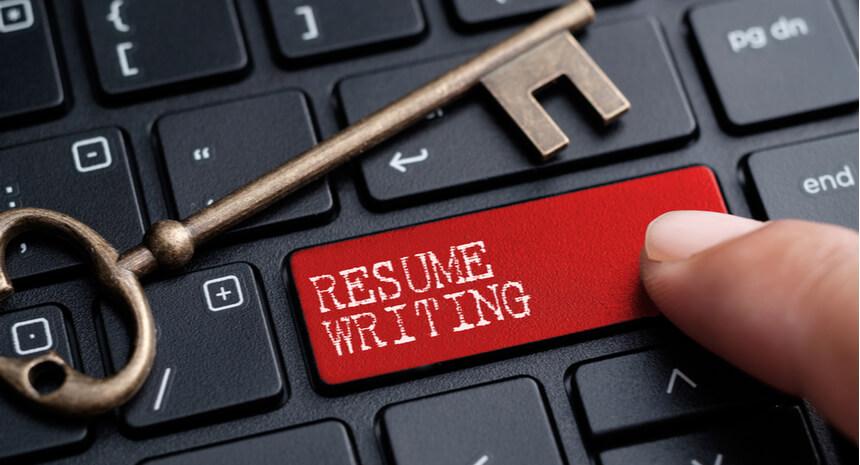
How to Write a Resume: Guide & Examples for 2026
If you re wondering how to write a resume that grabs attenti...

Summary of Qualifications: 13 Examples for Your Resume
Our guide will help you write a summary of qualifications that...
Accounting Clerk Cover Letter: Examples & Templates
As an accounting clerk you re expected to demonstrate strong ...
Chartered Accountant Cover Letter: Examples & Templates
Employers are looking for chartered accountant job seekers who...
Accounting Assistant Cover Letter: Examples & Templates
As an accounting assistant you play an important role in main...

